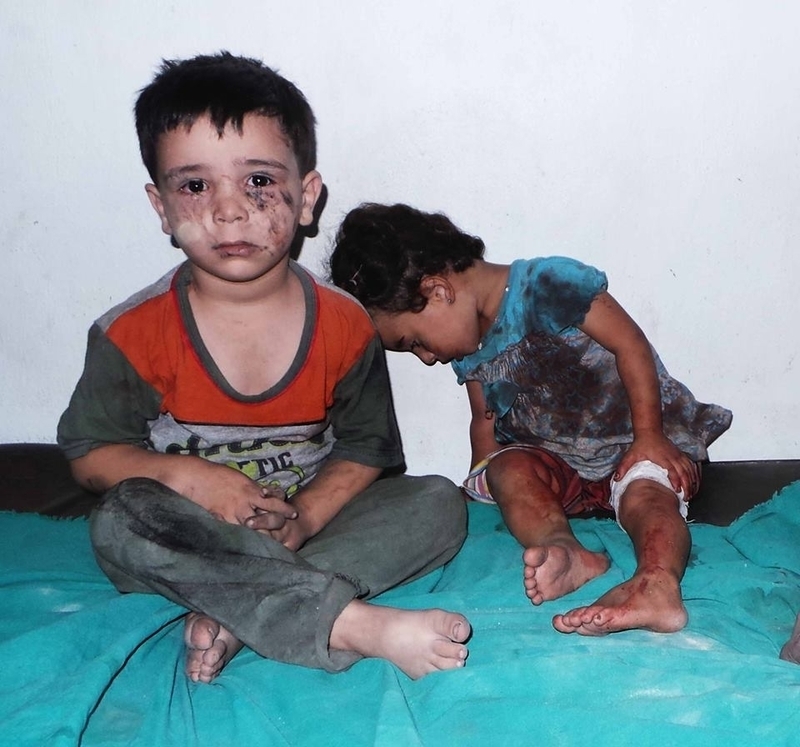Until the Geneva II conference Abu Hecham, 57, from the town of Arbeenin in Eastern Ghouta, Damascus countryside, hated politics, politicians and the news, believing it all nothing but lies.
His position has changed now though, and he is following developments at Geneva. Abu Hesham has lost his three sons. One, 34, was arrested by the regime for participating in demonstrations two years ago. A few months later, his other two sons were martyred along with 56 members of the Free Syrian Army for trying to bring flour to civilians in the Qalamoun area.
In these difficult circumstances, under siege, hunger and destruction, Abu Hecham does not know how to feed his sons’ eight children, or the four women. Previously, Abu Hecham was earning an average income and his children had been working. But he lost everything. His grandchildren and all women in the family are suffering acute malnutrition. He has kidney disease that needs continuous dialysis and which can no longer be treated after the only medical facility was closed as a result of lack of electricity. One of his grandchildren joined an army battalion as a chef's assistant just to bring money to the family.
Abu Hecham saved some money to buy batteries for the old radio, just to follow the news of Geneva II. This was the conference that would end his tragedy, as he was led to believe. He wanted to know all the details; when his son would be released, when the siege would be broken so his babies could eat, and when the shelling would stop.
As he istenined to the head of the opposition Syrian National Coalition, Ahmad Jarba, speak, he nodded his head, confirming every word, lifting his hands in prayer, intoning: “God be with us”.
But when the Syrian Foreign Minister, Walid Mouallem spoke, he cursed the hypocrite liar and his regime. His eyes shined with hope while his hungry babies gathered around him, hoping that the conference results would be reflected as bread, eggs, and fruit, and peaceful nights.
The family engagement with the conference was noticeable despite the silence. They waited for conclusive results. For them it offered a glimmer of hope.
The first round of the negotiations between the coalition and regime delegations, under the supervision of United Nations and other countries has now finished, but there is still no fruit, no bread, and no eggs in the basket.
The radio was at Abu Hecham’s ear for a whole week, he listened to the news, to the backdrop of barrel bombs exploding.
"There are fifty barrels," he screamed. "Has the regime defeated all the countries in the conference? Are these the results?"
Mohammad Adumani is a doctor who witnessed the regime's crimes first hand during the course of the three-year Syrian revolution. He too has been following the Geneva conference since its inception.
In a analysis commentary on his personal Facebook page, he was encouraging of opposition participation in the conference, believing there would be a political solution to stop the sound of bullets.
We met Adumani at the conclusion of the first week of the conferenece.
"There is hope. 900 days of bullets and fire, and we have not realized the revolution’s goals. How can some people think that a week would be enough?” he asked.
"So many people rejected the Geneva conference, but still looked forward to it, hoping it would bring the solution, whether they said it or not. People waited for the results, because they are just exhausted."
The doctor says the conference did not fail. Rather, it has revived the idea that this is a revolution. It exposed the ugly face of this regime and its crimes, and changed the view of the world towards the Syrian cause, reminding them that people are being slaughtered by this regime.
But, he also said the Syrian people need a firm and real international stance.
"We are not disappointed in our delegation to the conference. But, as usual, the international community had disappointed us," he said, repeating the words of the head of Coalition: "Our time was and continues to be made of blood."
Fatimah, 30, is a martyr’s widow, a martyr’s mother, and the sister of an arrested woman. She expressed contempt when asked about the conference.
"Those who have been watching us get killed for three years will not be moved now. Damn them and their conferences; they will not do anything for us," she said.
Yahya is a fighter with the Free Syrian Army and a third-year engineering college student. He abandoned his studies to join one of the battalions. He has never believed in conferences, nor in the international community’s desire to find a solution to the crisis, pointing out that the international community has remained silent over the killing of the Syrian people.
"Nothing will stop this criminal but weapons, tell them to send weapons," he said.
These are all contrasting opinions on Geneva, but there is one unanimous agreement: The result of the first round of the conference were shocking. The entire international community represented by the U.N. is responsible for ending the killing, and it knows full well that the regime will not accept any solution that is not enforced upon it by the international community by treating the Syrian regime as a threat to international peace and security under Chapter VII of the Charter of the United Nations Security Council. On the grounds that Syria and its people is an integral part of the world and a founding member of the United Nations, it is the international community’s immediate duty to intervene to protect its people.
......


